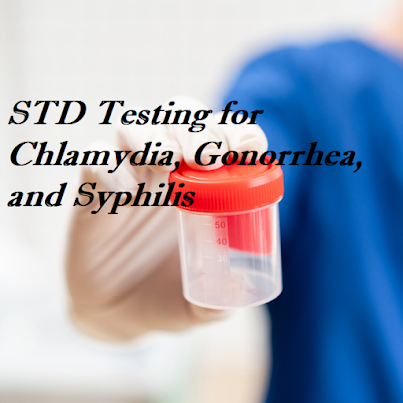STD Testing for Chlamydia, Gonorrhea, and Syphilis: What You Need to Know
Sexually
transmitted diseases (STDs), also called sexually transmitted infections
(STIs), are infections spread through sexual contact. According to the CDC,
nearly 2.5 million cases of chlamydia, gonorrhea, and syphilis
were reported in the U.S. in 2022 alone—a troubling increase over previous
years.
These
three bacterial infections are among the most common STDs and
can lead to severe health complications if left untreated, including infertility,
pelvic inflammatory disease (PID), and even neurological damage (in the case of
syphilis). The good news? All three are curable with antibiotics,
but early detection through STD testing is crucial.
This
guide covers everything you need to know about chlamydia, gonorrhea,
and syphilis testing, including symptoms, testing methods, treatment, and
prevention.
Understanding Chlamydia, Gonorrhea, and Syphilis
1. Chlamydia
·
Cause: Chlamydia trachomatis bacteria.
·
Transmission: Vaginal, anal, or oral sex.
·
Risk: Often asymptomatic (no
symptoms), especially in women, which can lead to untreated infections
causing PID and infertility.
2. Gonorrhea
·
Cause: Neisseria gonorrhoeae bacteria.
·
Transmission: Sexual contact (genital, oral,
anal).
·
Concern: Increasing antibiotic
resistance, making some strains harder to treat.
3. Syphilis
·
Cause: Treponema pallidum bacteria.
·
Stages:
o Primary: Painless sores (chancres).
o Secondary: Rash, fever, swollen lymph
nodes.
o Latent/Tertiary: Can damage the heart, brain,
and nerves if untreated.
Co-infections
are common—many
people with one STD may have another, so full-panel testing is
recommended.
Symptoms to Watch For
Chlamydia & Gonorrhea Symptoms
|
Men |
Women |
|
Burning while urinating |
Vaginal discharge |
|
Discharge from penis |
Painful urination |
|
Testicular pain |
Pelvic pain (PID risk) |
Both
genders:
Often no symptoms, especially with chlamydia.
Syphilis Symptoms
·
Primary: Painless sore (chancre) at
infection site.
·
Secondary: Rash (often on palms/soles),
fever, fatigue.
·
Latent/Tertiary: Severe organ damage (years
later).
Key
Takeaway: Get
tested regularly—many STDs show no symptoms but can still cause harm.
STD Testing Methods
1. Chlamydia & Gonorrhea Testing
·
Urine Test: Most common, detects bacterial
DNA.
·
Swab Test: For throat, rectum, or cervix
(more accurate in some cases).
2. Syphilis Testing
·
Blood Test:
o RPR/VDRL (screening).
o FTA-ABS (confirms infection).
·
Sore Testing: Microscopic exam (rarely used).
At-Home Testing Kits
·
Pros: Convenient, private.
·
Cons: May have false negatives;
follow up with a clinic if positive.
When to Test?
·
Window Periods:
o Chlamydia/Gonorrhea: 1–5
days after exposure.
o Syphilis: 3–6
weeks for accurate blood tests.
·
Retesting: Recommended 3 months after
treatment.
Where to Get Tested
|
Option |
Pros |
Cons |
|
Planned Parenthood |
Low-cost, confidential |
Limited locations |
|
Local Health Clinics |
Free/sliding scale |
Long wait times |
|
Private Labs (Quest, LabCorp) |
Fast results |
Costly without insurance |
|
Online Services (Nurx, Everlywell) |
Home testing |
May lack counseling |
Cost
Considerations:
·
Many clinics offer free
or low-cost testing.
·
Insurance (including Medicaid)
usually covers STD tests.
Treatment & Prevention
Treatment
·
Chlamydia: Azithromycin or Doxycycline
(1-week course).
·
Gonorrhea: Ceftriaxone shot (due to
antibiotic resistance).
·
Syphilis: Penicillin injection (longer
treatment for late-stage).
Important:
·
Notify partners—they need testing/treatment too.
·
No sex until treatment is
complete (usually
7 days).
Prevention Tips
✔ Condoms reduce but don’t eliminate
risk.
✔ Regular testing (yearly if sexually
active).
✔ Monogamy with a tested partner
lowers risk.
Debunking STD Myths
❌ Myth: "Only promiscuous people
get STDs."
✅ Fact: Anyone sexually active can get
an STD—even from one partner.
❌ Myth: "You can’t get STDs from
oral sex."
✅ Fact: Gonorrhea/chlamydia can infect
the throat.
❌ Myth: "If treated, you can’t get
reinfected."
✅ Fact: You can catch STDs
again—practice safe sex!
STD
testing is a vital part of sexual health. Chlamydia, gonorrhea, and
syphilis are common, treatable, and often symptomless—making
regular screenings essential. Whether through a clinic, lab, or at-home
test, getting tested is quick, confidential, and lifesaving.
Don’t
wait for symptoms. Schedule
a test today—your health is worth it!

